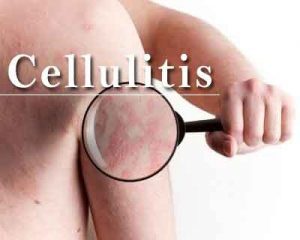- Home
- Editorial
- News
- Practice Guidelines
- Anesthesiology Guidelines
- Cancer Guidelines
- Cardiac Sciences Guidelines
- Critical Care Guidelines
- Dentistry Guidelines
- Dermatology Guidelines
- Diabetes and Endo Guidelines
- Diagnostics Guidelines
- ENT Guidelines
- Featured Practice Guidelines
- Gastroenterology Guidelines
- Geriatrics Guidelines
- Medicine Guidelines
- Nephrology Guidelines
- Neurosciences Guidelines
- Obs and Gynae Guidelines
- Ophthalmology Guidelines
- Orthopaedics Guidelines
- Paediatrics Guidelines
- Psychiatry Guidelines
- Pulmonology Guidelines
- Radiology Guidelines
- Surgery Guidelines
- Urology Guidelines
Preventing the misdiagnosis of cellulitis

No diagnostic tool is currently available for Cellulitis -- a bacterial infection of the skin and only way to diagnose cellulitis is on the basis of inflammation. At times it is therefore misdiagnosed with pseudocellulitis that mimics it . A recent study by researchers from Brigham and Women's Hospital has found that that early consultation by a dermatologist for patients with presumed cellulitis was a cost-effective intervention to prevent misdiagnoses and improve health-related outcomes. Their results are published in JAMA Dermatology.
"This is a big win-win for both the patients and for the hospitals," said corresponding author Arash Mostaghimi, MD, MPA, MPH, Director of Inpatient Dermatology. "Our findings show that early intervention by dermatologists for patients with presumptive cellulitis, not only improves outcomes for the patients, but saves the hospitals on costs associated with unnecessary hospitalization and opens up beds in the emergency department."
Previous work by Mostaghimi and his colleagues evaluated a series of patients in BWH's Emergency Department with presumptive diagnosis of cellulitis and determined that a third of these patients had pseudocellulitis. Alarmed by this statistic, the dermatology consult team partnered with the inpatient group and ED to provide dermatology consultation for 165 patients in the ED observation unit who were about to be admitted with presumptive diagnosis of cellulitis. A third of these patients were diagnosed with pseudocellulitis by dermatology consultation. The dermatologists recommended the discontinuation of antibiotics in 82.4 percent of these patients, and discharge from planned observation or inpatient admissions in half of the patients. None of the patients diagnosed with pseudocellulitis showed worsening of their condition after discharge.
Extrapolating from their findings, the researchers estimate that dermatology consultation for presumed cellulitis could nationally prevent between 97,000 to 256,000 in hospitalization days and 34,000 to 91,000 cases of unnecessary antibiotic exposure. It could also result in $80 million to $210 million in net cost savings annually.
While the results of their proof-of-concept study show the benefits of early dermatology consultation, the major challenge now is scalability. The researchers have already implemented protocols at BWH to involve dermatology experts early in the care of patients with presumptive cellulitis, but this is hard to do in settings that do not have access to 24/7 dermatology consultation, such as primary care offices, nursing homes and rehabilitation centers. Mostaghimi and his team are currently developing tools to allow them to provide high quality dermatology consultation remotely, which they call "teledermatology," to improve health-related outcomes of pseudocellulitis diagnoses on a much larger scale.
This study was funded by the National Center for Advancing Translational Sciences, National Institutes of Health, and by the Brigham and Women's Physician Organization Brigham Care Redesign Incubator and Startup Program (BCRISP).
For more details click on the link: JAMA Dermatology, 2018; DOI: 10.1001/jamadermatol.2017.6197
Brigham Care Redesign Incubator and Startup ProgramcellulitisdermatologistDermatologyJAMA Dermatologyjournal JAMA Dermatologypseudocellulitisskin inflammation
Source : Press ReleaseNext Story
NO DATA FOUND

Disclaimer: This site is primarily intended for healthcare professionals. Any content/information on this website does not replace the advice of medical and/or health professionals and should not be construed as medical/diagnostic advice/endorsement or prescription. Use of this site is subject to our terms of use, privacy policy, advertisement policy. © 2020 Minerva Medical Treatment Pvt Ltd